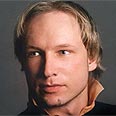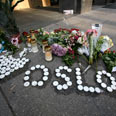
Anders Breivik - extreme rightist and Christian fundamentalist
Facebook photo

Oslo mourns
Photo: Reuters
The barbaric massacres in Oslo and at the Labor Party’s youth movement camp on the island of Utoya raise many questions. It once again proved, however, what hate and terror experts have known for many years: One does not have to be a member of fanatic and violent organizations to adopt their message, and in the extreme case act according to their recommendations.
The Internet permits people to belong, and at the same time not belong. Even though there are claims that murderer Anders Breivik published posts on neo-Nazi sites, a lone wolf like him can be eclectic nowadays and take his ideas from various sources.
Norway Massacre
Reuters and Ynet
Carnage in Norway: Gunman with links to far Right murdered at least 85 youngsters at ruling party summer camp near Oslo, local police chief says; seven people killed in Oslo car bombing earlier
The Norwegian extreme Right is very small in number. From what is known now, Breivik is described as an extreme rightist and also as a Christian fundamentalist. While there are numerous such fundamentalists in Norway, they operate within the parameters of Norwegian democracy and do not promote any violence.
The Israeli government has done what it should do. President Shimon Peres, Prime Minister Benjamin Netanyahu and other cabinet members have expressed Israel’s condolences to Norway. The Israeli Embassy in Oslo, in what is considered an unusual act concerning an event in the host country, lowered its flag to half mast to express its horror at the tragedy that has befallen Norway.
It was clear from the beginning that Israel would somehow be drawn into the general debate on these terror attacks. The first reason is that there is an obsession in Norway with Israel, and its mentions in the media probably exceed those of, for instance, its giant neighbor Russia whose acts are far more relevant to Norway than those of remote and small Israel.
There were other reasons as well. Terror in a democracy and how to defend oneself against it is an issue that almost by nature draws in references to precedents from Israel. Additionally, the inefficient and slow reaction of the Norwegian police to the Utoya massacre can best be evaluated when one compares it to how Israel reacts to such events.
‘It cannot happen here’
Many foreigners wonder why there were so many youngsters on the island without any security personnel around at all. Norway, however, has no experience with terrorism. There was also a general mood in society that terrorism “cannot happen here.”
This belief was backed in part by Norway being one of the most appeasing democracies toward radical Islam. As soon as one of its small journals published the Danish Mohammed cartoons, huge pressure was applied on the editor to apologize. The Norwegian government also sent diplomatic envoys to Muslim countries to state that they distance themselves from any such criticism.
Similarly, lone wolf murderers, like the one in Malmö in neighboring Sweden last year, are unknown as well.
One of my more memorable observations during a stay in Oslo last year was the relative absence of security at the Storting, the Norwegian Parliament. I am not comparing it to security at the Israeli Knesset but to, for instance, the Dutch Parliament. The only two places in town where the security measures stand out are the fortified Israeli Embassy and the Jewish community buildings.
In a societal climate such as this, extremists of all shades are not subject to much scrutiny. One can see this best concerning extreme anti-Semites. Tore Tvedt, Norway’s best known neo-Nazi, had once told the country’s leading paper Verdens Gang – the one whose buildings were bombed last Friday – that “the Jews are the main enemy;” “they killed our people;” “they are evil murderers;” “they are not human beings and should be uprooted.” In 2007, the District Court found him not guilty of anti-Jewish harassment. This verdict was later overturned.
This same court, however, found another right-winger, Terje Sjolie, not guilty because Norway grants freedom of expression. He had said that the country was being destroyed by Jews.
In the meantime, an additional element has come to the fore and will stress Israeli aspects remotely connected to the massacre even more: Well-known anti-Israelis such as Foreign Minister Jonas Gahr Stoere and Sidsel Wold, the NRK state broadcasting group’s correspondent in Israel, spoke at the Labor Party’s youth camp before the massacre. Stoere was welcomed while in the background posters were hanging with “Boycott Israel” written on them.
It is too early now to assess how all of this will develop further. It is certain, however, that in future Israeli-Norwegian relations and the public debate around them the Breivik murders will be mentioned quite frequently.
Dr. Manfred Gerstenfeld has published 20 books. Two of these address Norwegian anti-Israelism and anti-Semitism
- Follow Ynetnews on Facebook















